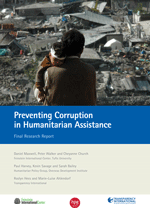Leaders in the humanitarian community have resolved to do more to address the risks of corruption in relief efforts. Preventing Corruption in Humanitarian Assistance documents perceptions of corruption in humanitarian operations through interviews with staff of several leading international humanitarian NGOs. The study was commissioned by Transparency International (TI) and conducted jointly by the Feinstein International Center, the Humanitarian Policy Group at the Overseas Development Institute in London, and TI.
The report finds that humanitarian agencies providing vital relief are aware of corruption risks and have developed a range of policies and practices to prevent it. However, the definition of corruption tends to remain narrowly focused on financial fraud, and the humanitarian community at large has not yet addressed this problem in a comprehensive manner. Humanitarian aid providers would benefit from wider and more systematic exchange on new approaches and best practices, including evaluating their effectiveness in mitigating corruption.
Corruption in humanitarian assistance has become a concern of increasing importance, at least since the response to the Indian Ocean tsunami crisis in 2004/2005, and reports of other corrupt practices such as sexual exploitation and abuse of the recipients of humanitarian assistance, brought to light earlier this decade. This study is the first attempt to document, from the point of view of humanitarian practitioners, perceptions of the importance of the problem, the constraints to dealing with corruption, and critically, to document best practices for preventing and mitigating corruption.

